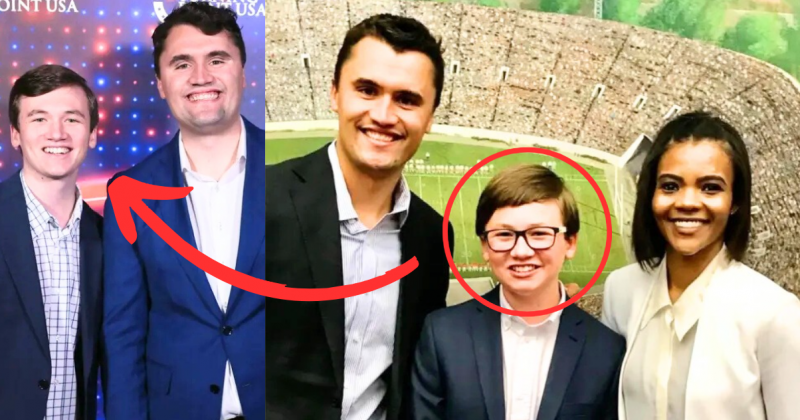The rise and decline of Brilyn Hollyhand, who some believe is the “protege” that has been tapped to be Charlie Kirk’s replacement, has been a spectacle to watch development since the conservative activist was murdered on Sept. 10.
Hollyhand gained attention in early 2023 when he pitched a new idea directly to then–Republican National Committee Chair Ronna McDaniel, niece of Sen. Mitt Romney (R-UT).
His proposal: establish a youth advisory council to give young conservatives a voice and to help mobilize Gen Z voters ahead of the 2024 election.
McDaniel accepted the idea, and by mid-2023, the RNC Youth Advisory Council was formally launched, co-chaired by Hollyhand and conservative commentator C.J. Pearson.
The stated goal was straightforward: to organize, empower and involve young conservatives in the political process.
The RNC backed the initiative, offering institutional resources and access to its national network.
On paper, it was an opportunity to bridge the generational gap within the party and energize new voters for Donald Trump’s expected campaign.
Rift News reported that Hollyhand had every advantage: funding, infrastructure, credibility and media exposure. However, by the end of 2023, the council’s momentum had stalled entirely.
There were no visible organizing efforts, no documented outreach to young voters and no coordinated campus initiatives.
When questioned about tangible outcomes, Hollyhand pointed to an online debate event that he claimed had surpassed one million views.
He cited those numbers as proof of engagement, though viewership data does not necessarily translate into voter registration or election turnout. Meanwhile, Democratic operations and left-leaning youth coalitions were making measurable gains on college campuses nationwide.
Reports showed active voter registration drives and issue-based organizing, while the RNC Youth Advisory Council appeared largely absent from the field.
Rift News noted that in December 2023, the council faced a public crisis.
Several members—including Republican strategist Caroline Wren—announced their resignation, citing the group’s “lack of organization, tangible goals and vision.”
Their joint letter accused the RNC of using the initiative as “another failed fundraising ploy.”
Amid growing discontent, Hollyhand released general statements referencing “engagement” and “exposure,” but he offered no evidence of results or strategic direction.
Disillusionment spread as other members accused him of defending Ronna McDaniel’s leadership, which had already faced scrutiny over party fundraising and electoral setbacks.
Tyler Bowyer, Chief Operating Officer of Turning Point Action, also criticized Hollyhand for defending the RNC’s “Bank Your Vote” campaign; a program launched not in swing states like Georgia, Pennsylvania or Arizona, but in deep-blue states such as California and New York.
Despite widespread disappointment in the council’s performance, Hollyhand has continued to promote his co-chair title prominently.
His speaker booking website reportedly lists appearance fees exceeding $7,000 plus travel expenses, a rate that has drawn attention given the council’s lack of concrete achievements.
It remains unclear how much he has earned from conservative student organizations or conferences, but his self-branding continues.
Critics on social media have noted that he appears more focused on leveraging the title than addressing the initiative’s failures.
Beyond the Youth Advisory Council, questions have also been raised about Hollyhand’s past accolades—most notably, his John Lewis Youth Leadership Award presented in 2022.
The award was given to him by John Merrill, then Alabama’s Secretary of State and Chair of the National Association of Secretaries of State (NASS).
Between 2009 and 2020, Merrill received nearly $20,000 in campaign donations from Hollyhand’s grandfather, businessman Doug Hollyhand.
Merrill personally presented the award to Brilyn in 2022, shortly before leaving office following reports of an extramarital affair.
Public descriptions of the award’s basis cite Hollyhand’s media appearances and interviews with politicians—but no substantive leadership projects or organizational work.
The John Lewis Youth Leadership Award’s own ethics statement reads: “Under no circumstances is it permissible for a Secretary of State to present the John Lewis Youth Leadership Award for personal, financial, or professional gain.”
Some have argued that the award, like the RNC Youth Council role, reflects style over substance; a symbol of résumé conservatism, where credentials are accumulated without corresponding results.
Further distancing himself from the conservative grassroots, Hollyhand has also voiced positions at odds with the America First movement.
Rift News reported that during a recent speaking event, he advocated for expanded legal immigration and described America as a “melting pot.”
In another instance, Hollyhand appeared uncertain about whether AIPAC—the American Israel Public Affairs Committee—should register under the Foreign Agents Registration Act (FARA), a law designed to ensure foreign entities do not exert undue influence on U.S. policy.
To many conservatives, this uncertainty underscored a lack of policy depth and alignment with the new generation of America First activists.
As the Republican Party undergoes a generational transformation, younger conservatives are increasingly calling for leadership rooted in accountability, sovereignty and tangible results.
They are rejecting globalist frameworks, foreign entanglements, and establishment talking points.
To them, the record of the so-called Kirk protege embodies the disconnect between Washington branding and grassroots activism.
His failed RNC initiative, questionable award recognition, and policy missteps illustrate the pitfalls of résumé conservatism—leadership in title only.
For many within the movement, the takeaway is clear: the conservative base no longer wants polished speeches and social-media posts. It wants leaders who act, deliver and fight for the principles of the America First agenda.

